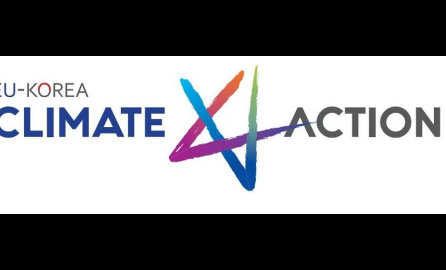EU-Korea Climate Action Project
The EU-Korea Climate Action Project is a three-year project funded by the European Union to accelerate climate actions in Korea. The project aims at strengthening networks, dialogue and cooperation among Korean stakeholders and between Korea and the EU to enhance climate action at the non-state actors’ level.
Project Description

1. About the Project
The European Union (EU) and the Republic of Korea (South Korea) share the goal to reduce their greenhouse gas (GHG) emissions and to foster more resource efficient and greener economies. Both the EU and Korea are strongly committed to implementing the 2015 Paris Agreement and delivering on their respective domestic commitments under the Agreement.
The EU-Korea Climate Action Project is a three-year project funded by the European Union to accelerate climate actions in Korea, which was successfully completed in October 2021. The project was strengthening networks, dialogue and cooperation among Korean stakeholders and between Korea and the EU in order to enhance climate action at the non-state actors’ level.
2. Thematic Priority Areas
Considering the drivers of global warming and key responsible sectors in Korea, the EU-Korea Climate Action Project focused on renewable energy, energy efficiency in buildings and low-carbon mobility, as well as other cross-cutting issues such as green finance and coal phase-out.
- Renewable Energy
The abundant use of fossil energies such as coal, petroleum oil and natural gas for power generation and transport is the major source of carbon emissions to the atmosphere. Korea’s share of new and renewable energy in electricity generation was about 9% which decreases to 4% if the waste, fuel cell and IGCC (Integrated Gasification Combined Cycle) are excluded according to the IEA’s definition of RE. The project helped non-state stakeholders to accelerate actions that effectively switch energy use from fossil fuel to renewable energy.
- Energy-Efficient Building
Buildings have a long life-cycle which can lock in high carbon emissions for decades if not designed for wise energy use. Savings in energy means to gain financial wins through less emission. Non-state actors such as local governments in collaboration with utilities, developers, building industry, building owners and occupants have ample room for focused action to accelerate zero energy building and improve energy performance of existing buildings.
- Low-Carbon Mobility
There are ample options to connect people conveniently through low-carbon transportation modes. Electric trains, trams and electric buses are the best public transport solutions. Electric drives are the upcoming solution also for automobiles and will replace the conventional combustion engines. The most sustainable mobility choices are cycling and walking. Since every mode in itself is limited to achieve the mobility demands in most cases, low carbon mobility requires a combination of efficient transport modes and infrastructure to conveniently reach a desired destination with the least possible carbon footprint.
3. Project Stakeholders
The project stakeholders were comprised of the following four groups:
- Local governments, including municipal and provincial governments and agencies
- NGOs, including civil society and environmental activists
- Private sector, including companies and business organizations
- Academia and research institutions including universities
Please see below the final project video of the EU-Korea Action Project.
1. English Version
2. Korea Version
